Top Rankings
Clay County School District ranks among the top 20% of public school district in Georgia for:
Category
Attribute
Student Attention
Lowest student:teacher ratio (Top 1%)
For the 2025 school year, there is 1 public middle school serving 50 students in Clay County School District. This district's average middle testing ranking is 1/10, which is in the bottom 50% of public middle schools in Georgia.
Public Middle School in Clay County School District have an average math proficiency score of 12% (versus the Georgia public middle school average of 35%), and reading proficiency score of 17% (versus the 39% statewide average).
Minority enrollment is 98% of the student body (majority Black), which is more than the Georgia public middle school average of 66% (majority Black).
Overview
This School District
This State (GA)
# Schools
2 Schools
669 Schools
# Students
205 Students
460,632 Students
# Teachers
25 Teachers
32,363 Teachers
Student : Teacher Ratio
8:1
8:1
District Rank
Clay County School District, which is ranked within the bottom 50% of all 222 school districts in Georgia (based off of combined math and reading proficiency testing data) for the 2021-2022 school year.
Overall District Rank
#191 out of 222 school districts
(Bottom 50%)
(Bottom 50%)
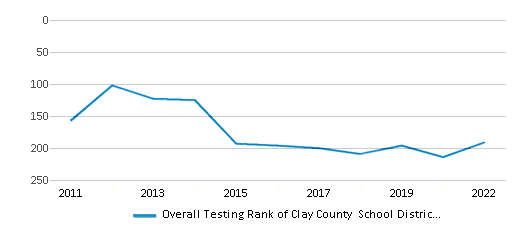
Math Test Scores (% Proficient)
15-19%
37%
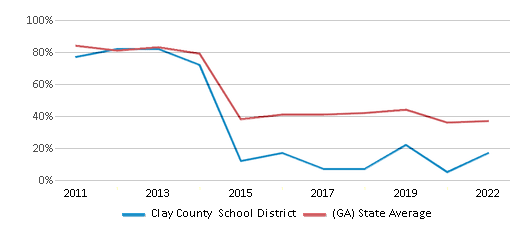
Reading/Language Arts Test Scores (% Proficient)
20-24%
40%
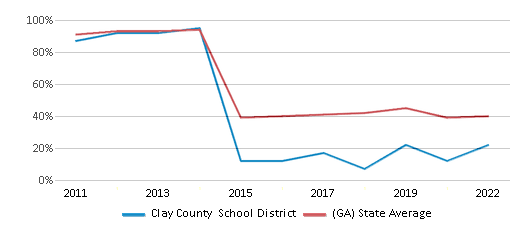
Science Test Scores (% Proficient)
11-19%
40%
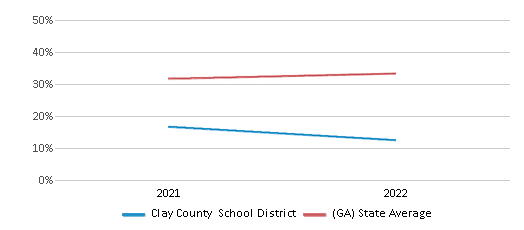
Students by Ethnicity:
Diversity Score
0.10
0.71
# American Indian Students
1 Student
1,062 Students
% American Indian Students
1%
n/a
# Asian Students
n/a
21,729 Students
% Asian Students
n/a
5%
# Hispanic Students
1 Student
82,070 Students
% Hispanic Students
n/a
18%
# Black Students
194 Students
174,895 Students
% Black Students
95%
38%
# White Students
8 Students
158,602 Students
% White Students
4%
34%
# Hawaiian Students
n/a
523 Students
% Hawaiian Students
n/a
n/a
# Two or more races Students
1 Student
21,751 Students
% of Two or more races Students
n/a
5%
Students by Grade:
# Students in PK Grade:
18
1,052
# Students in K Grade:
26
5,528
# Students in 1st Grade:
22
5,888
# Students in 2nd Grade:
23
6,121
# Students in 3rd Grade:
27
5,929
# Students in 4th Grade:
19
6,158
# Students in 5th Grade:
20
8,331
# Students in 6th Grade:
16
125,682
# Students in 7th Grade:
18
131,446
# Students in 8th Grade:
16
133,602
# Students in 9th Grade:
-
10,391
# Students in 10th Grade:
-
7,643
# Students in 11th Grade:
-
6,973
# Students in 12th Grade:
-
5,888
# Ungraded Students:
-
-
District Revenue and Spending
The revenue/student of $26,571 is higher than the state median of $14,305. The school district revenue/student has stayed relatively flat over four school years.
The school district's spending/student of $24,829 is higher than the state median of $13,431. The school district spending/student has stayed relatively flat over four school years.
Total Revenue
$5 MM
$24,999 MM
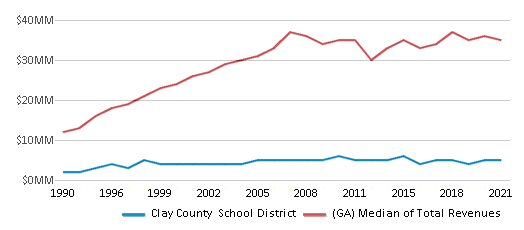
Spending
$5 MM
$23,473 MM
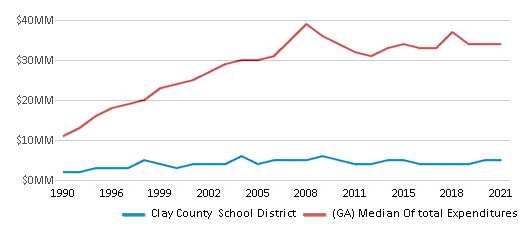
Revenue / Student
$26,571
$14,305
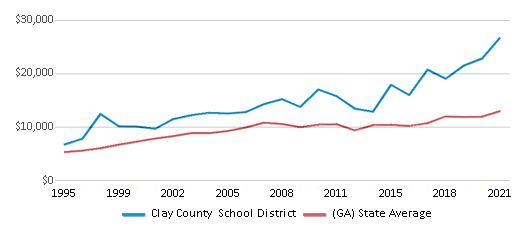
Spending / Student
$24,829
$13,431
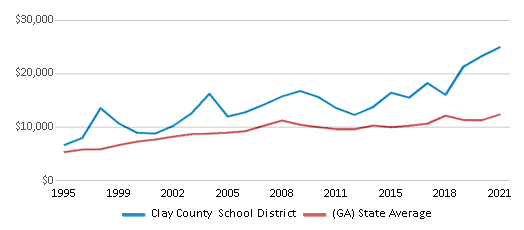
Best Clay County School District Public Middle Schools (2025)
School
(Math and Reading Proficiency)
(Math and Reading Proficiency)
Location
Grades
Students
Rank: #11.
Clay County Middle School
(Math: 10-14% | Reading: 15-19%)
Rank:
Rank:
2/
Bottom 50%10
200 Hobbs Ln
Fort Gaines, GA 39851
(229) 768-2234
Fort Gaines, GA 39851
(229) 768-2234
Grades: 6-8
| 50 students
Recent Articles

Year-Round Or Traditional Schedule?
Which is more appropriate for your child? A year-round attendance schedule or traditional schedule? We look at the pros and cons.

Why You Should Encourage Your Child to Join a Sports Team
Participating in team sports has a great many benefits for children, there is no doubt. In this article you will learn what those benefits are.

White Students are Now the Minority in U.S. Public Schools
Increasing birth rates among immigrant families from Asia and Central and South America, combined with lower birth rates among white families, means that for the first time in history, public school students in the United States are majority-minority. This shift in demographics poses difficulties for schools as they work to accommodate children of varying language abilities and socio-economic backgrounds.





